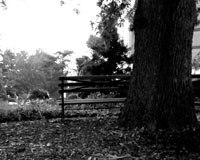
Flight School
Clio, Muse of History
What I Learned Picking Blackberries at the Farm Dump
At first glance, I wonder what’s dead
beneath the turning wings
of turkey vultures in a cloudless sky
but nothing’s there. So, this
must be a day made all for play: buzzards
kettle and climb the warm
columns of air, then dive down to earth,
one by one, swoop and plunge,
soaring back into spirals of updraft
again. Creatures as certain
of gravity, matter and aerodynamics,
as I was, as a child,
of the strength of my father—who flew off
the known world last year—
when he’d toss my small body
impossibly high into sky
and then catch me as solid as lift, way back
on the days when he taught me to fly.
walks with me morning and evening
through rye, corn, and bean fields, through
pastures and steep-sided woods overrun
by black walnuts, her nose to the air, to the ground,
as she tracks the earthy rich present tense
only. Sometimes, when crossing the creek,
Clio drinks as I toss fat sycamore leaves
in the stream, watch them tumble and roll
toward the river, though mostly they snag up
on branches, spin slowly in eddies, and sink.
We move on. She doesn’t waste time on the past.
Oh, she knows what happened, how everyone tells
the story their way. Not that she’s blameless,
just honest. Sometimes when I call her to walk,
I find she’s been quietly sitting in shade,
licking her chops at the chicken house door.
What I Learned Picking Blackberries at the Farm Dump
That a world filled with red rusted tin cans and cobalt blue glass shards
from old cold cream pots spins out thousands of fat beaded globes
fed by thunder and sun, fed by hot summer downpours washing down
gullies through thickets of thorn.
That the thickets bear fruit atop great arching sprays on the thorn-studded
canes of the past.
That canes terrify flesh.
That some glossy berries are tight, bitter, juiceless, a mouthful of grit.
That I spit these ones out.
That it’s hard to know which ones are which until tested by tongue.
By then it’s too late— all that sour’s inside.
But also—when perfect— the sweet’s inside too.
That the thorns on the canes punish any resistance with barbed hooks curved back, drawing blood.
To escape you must reach deeper in.
That ticks live there too.
That calm is demanded and a rough long-sleeved shirt buttoned collar to cuff, canvas pants,
heavy boots, and a coffee can hung on a string.
That the dark, richest berries need shade to grow sweet.
That they purple my hands as I pick, and they purple my mouth as I eat, and they purple
this jam cooked with sugar and lemon pried open in winter and spooned out on toast
with the purple of all of it: present, past, body, blood, bittersweet, heat, rust, and sky.
Hayden Saunier is the author of five poetry collections; her most recent, A Cartography of Home, was published in 2021. Her work has been awarded the Pablo Neruda Prize, the Rattle Poetry Prize, Gell Poetry Award, has been featured numerous times on The Writers Almanac, Poetry Daily, Verse Daily and published in journals such as 32 Poems, Beloit Poetry Journal, Pedestal, Thrush, and VQR. Hayden is the founder and director of No River Twice, an interactive, audience-driven, poetry performance group.

